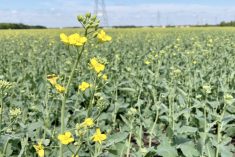The Canadian arm of agrifood giant Cargill plans to further expand its reach in the Prairie canola market with a new crush plant at Regina and upgrades elsewhere.
The company announced Thursday it would start construction on the $350 million plant “early next year” and expects to have it operating by early 2024, employing about 50 people full-time.
The new facility would have a “similar design” to Cargill’s existing crush plant at Camrose, about 80 km southeast of Edmonton, and would have capacity to process up to one million tonnes of canola per year.
Read Also

Alberta crop conditions improve: report
Varied precipitation and warm temperatures were generally beneficial for crop development across Alberta during the week ended July 8, according to the latest provincial crop report released July 11.
Cargill also said Thursday it will “update and modernize” the Camrose crush plant and its other Saskatchewan canola plant at Clavet, about 20 km southeast of Saskatoon.
Those upgrades, Cargill said, will be done over the next 12 months to “increase volume and broaden capabilities at both locations.” The company didn’t say by how much the upgrades will raise capacity at those plants.
Cargill didn’t say where exactly in Regina it will build the new plant. A company representative said via email that Cargill has options on “a number of parcels” of land near the city and will run due diligence on those sites in coming months.
Separately, CBC on Thursday quoted Cargill as saying it is not the unnamed buyer who recently optioned land just north of the Co-op Refinery Complex in a controversial $4 million deal with the city.
“We see Saskatchewan as the right place to make this investment, as Regina is well-positioned in the canola production area and there is ample talent available to support the new facility,” Jeff Vassart, president of U.S-based Cargill’s Canadian arm, said in a release.
“Our Saskatchewan producers are known worldwide for the safe, high-quality commodities that they produce and this announcement creates the opportunity for them to see a higher return for their product,” provincial Agriculture Minister David Marit said Thursday in a separate release.
Canola values suggest the crop — currently, at least — is hard to come by, with ICE May canola closing Thursday at $877.60 per tonne and new-crop November canola closing at $694.
Supply and demand estimates released Tuesday from Agriculture and Agri-Food Canada, meanwhile, put canola ending stocks for the 2020-21 and 2021-22 crop years at 700,000 tonnes, well down from the 3.13 million-tonne carryout seen in 2019-20. New estimates for this spring’s canola acres are due out Tuesday next week from Statistics Canada.
A company representative said Thursday via email that Cargill sees market demand continuing for oilseeds worldwide in coming years, and the company’s processing investments “will position us to take advantage of the strong export markets, the continued demand from China and opportunities in the renewable diesel and biofuels space.”
The oilseed processing space could well become crowded in southern Saskatchewan in the near future. Federated Co-operatives (FCL) announced April 9 it would buy the assets of renewable diesel processor True North Renewable Fuels.
The co-operative objected when the aforementioned $4 million deal for the sale of over 630 city-owned acres just north of FCL’s Co-op Refinery Complex was made public.
In an April 11 letter to Regina Mayor Sandra Masters, FCL vice-president Pam Skotnitsky said the proposed sale to a still-unknown buyer “jeopardizes our planned investments and would force us to select a location apart from the city of Regina.”
Recent reports have pegged grain handler Viterra as the unnamed buyer of that parcel, saying it’s seeking land to build a crush plant of its own, although Regina-based Viterra hasn’t yet confirmed that to be the case.
Among other processors in the Prairie region, Winnipeg grain handler Richardson International announced last month it was starting work on upgrades that would about double the capacity of its canola crush plant at Yorkton, about 185 km northeast of Regina, to over 2.2 million tonnes per year.
Richardson in 2017 also completed an expansion of its crush plant at Lethbridge, Alta., bringing that site’s annual capacity to over 700,000 tonnes. — Glacier FarmMedia Network














